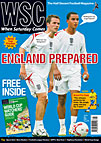 With the commencement of the World Cup imminent it remains to be seen whether Germany 2006 will show us something that we haven't experienced before
With the commencement of the World Cup imminent it remains to be seen whether Germany 2006 will show us something that we haven't experienced before
It feels as though the World Cup started several months ago. The hype that surrounds every tournament seems to have been that bit more insistent and frenetic this time. Partly that can be put down to the mounting media anxiety over Wayne Rooney’s “fight for fitness” and the possibility that one of England’s very few undeniably world-class players may not take part. More generally, though, the immense outpouring of guff and stuff about Germany 2006 – the proliferation of dire songs, documentaries of wildly varying quality and St George cross products choking supermarket aisles – just shows that football has become an easily exploitable cultural product.
We have reflected before on the fact that there was a time – soon it will seem like a distant and perhaps legendary past – when football existed for the benefit of those who went to watch it. These days, with matches on TV every day of the week during the season and players’ personal lives devoured by the tabloids, people who never go to games can feel justified in calling themselves fans; others who don’t even watch televised football feel obliged to hold opinions on it.
The World Cup build-up has heightened the sense that football is teetering under the enormous weight of importance forced upon it. But long-term supporters – from whose numbers we can exclude the recent BBC London radio caller who thought that West Ham are managed by Alan Partridge – have a secret weapon that will be unveiled once Germany 2006 has begun. As we will soon be reminded, possibly as early as the first game of the tournament, some football matches are monumentally boring and generate a special sort of tedium that can be borne only by those who have on occasions travelled long distances to sit or stand in foul weather through mind-bendingly uneventful goalless draws. Opening games of World Cups – Belgium’s goal in 1982 was the first in the fixture since 1962; only once since has a team won by anything other than 1-0 – have frequently required direct involvement or genuine interest to command attention. In fact the fixture’s dullness is directly proportionate to the amount of hype, fanfare and silly costumes that has preceded it.
Once underway the World Cup will have this useful sifting effect upon its television audience. People prepared to spend hours watching the build-up to an England match, possibly in a public place among a crowd of bellowing compatriots with painted faces, simply won’t be able to last the distance in a game featuring two other countries in which almost nothing happens, especially when it is being summarised by Graham Taylor. So with Germany 2006 almost upon us, it’s time to anticipate, even celebrate, some of the things about the World Cup that highlight the majestic pointlessness of much of football and its culture.
Many of the “star” players from the fancy sports gear adverts on 24-hour repeat from now until mid-July will fail to stay in the tournament long enough to do any of the slow-motion fancy flicks or backheels we’ve all become so attached to – look at France, goalless and on their way home after three games in 2002.
England, meanwhile, will often be unable to get the ball back off Paraguay – and when they do they will be unable to keep it for more than two passes. Despite somehow grinding out a deeply tedious 1-0 victory, they will eventually proceed to lose in fairly honourable fashion to the first decent team they come across, as in 1998, 2002 and Euro 2004.
The Group of Death is ostensibly so-called because of the difficulty of getting out of it; the reality is usually that the games between players terrified of making a mistake are so dull that you have to check people’s pulses every few minutes, just in case.
Garth Crooks will present at least one location report from a beer keller that will conclude with the phrase “drown their sorrows”. He will, as always, state the obvious in interviews and ask questions to which answers have already been given – viz asking Sven-Göran Eriksson if Joe Cole was an option up front in late May, after the coach had called him “a fifth striker” when he announced the squad.
Those African sides with Champions League stars will still be patronised on both channels; any reference in interviews by Ivory Coast or Angola players to “civil war” will be treated as a reference to dissension in the camp. The national dances of Ecuador and Paraguay will be added to samba and tango by those seeking to update their stereotypes. And someone will renew Denis Law’s old joke, when asked what he would say if he were in the Uruguay dressing room at half-time: “Sorry, lads, I don’t speak Uruguayan.”
All this inanity will baffle the novice; the true football fan will be pleasurably enraged by this familiar farce. And remembering where you were when England exited every tournament in your lifetime is a tradition that, if ever broken, somehow just won’t feel the same.
From WSC 233 July 2006. What was happening this month